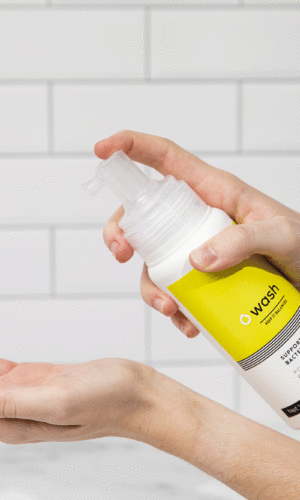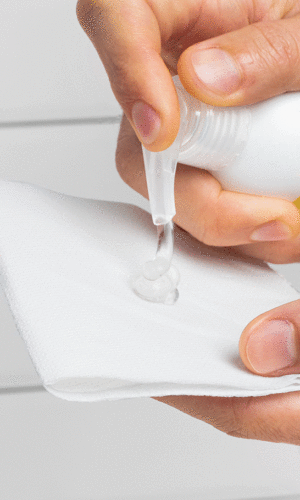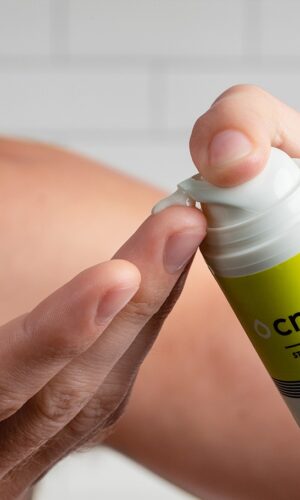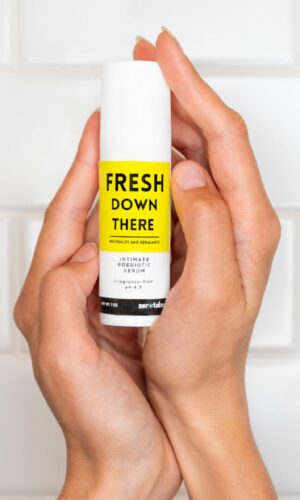
Date
You know the feeling when you get out of shower and need to moisturize the skin immediately, as it feels so tight. The main causes why your skin feels dry after shower include too long and too hot showers, harsh soaps you use, diet, environment, etc. In this post we will look at soaps, body washes, and shower gels you probably use daily and explain how they may harm (or benefit!) your skin.
What’s in your soap?
Harsh ingredients in your soap impact your skin microbiome, moisture, and overall skin health. Let’s look at the ingredients that impact the dryness of your skin the most.
Surfactants are used in soaps to remove dirt and oil. It is the main ingredient, that actually cleans. There are several types of surfactants, and some of them will remove good stuff from your skin too.
- Anionic surfactants are commonly used in household cleaners and personal care products – they are the most popular type.
- Cationic surfactants are often used in fabric softeners and hair conditioners.
- Nonionic surfactants are commonly used in laundry detergents and shampoos.
- Amphoteric surfactants are used in mild personal care products. They are the most gentle and can be beneficial for your skin.
The most common surfactants used in personal care products are sulfates, such as sodium lauryl sulfate (SLS) and sodium laureth sulfate (SLES). They belong to the group of anionic surfactants.
And, unfortunately, they strip the skin of its natural oils and disrupt the skin barrier, leading to dryness, irritation, and itching.
Surfactants have both a hydrophilic (water-loving) and lipophilic (oil-loving) end. The lipophilic end of the surfactant molecule attaches to the oils, while the hydrophilic end attaches to water. When a harsh anionic surfactant is rinsed away, it takes the natural oils with it, leaving the skin dry and potentially irritated.
Additionally, some surfactants can disrupt the skin’s natural barrier function, which helps to retain moisture and prevent water loss. When this barrier is disrupted, moisture can escape more easily from the skin, leading to dryness.
Not all surfactants have this drying effect on the skin, and many skincare products are formulated with gentle surfactants that help to cleanse the skin without stripping it of its natural oils.
“After using WASH for just a week you will notice that you don’t need lotion.”
For instance, amphoteric surfactants are the most gentle. In WASH we use these types of surfactants (linear amino acid-based), which allows to keep the skin subtle. This is why after using WASH for just a week you will notice that you don’t need lotion after showering.
What’s so good about amino acid-based surfactants? They are derived from natural sources, such as coconut or soy, and are made out of amino acids, which are the building blocks of proteins.
Because amino acid-based surfactants are derived from natural sources, they are less likely to cause irritation or dryness than synthetic surfactants. Additionally, amino acid-based surfactants have a lower pH than traditional surfactants, which helps to maintain the skin’s natural pH balance and prevent stripping of the skin’s natural oils.
Fragrances in body wash and other personal care products are a common cause of skin dryness and irritation. Fragrances are added to products to provide a pleasant scent and enhance the user’s sensory experience, or to mask the scent of other ingredients.
Fragrances can cause skin dryness and irritation in several ways.
- They disrupt the skin’s natural barrier function, which can lead to increased transepidermal water loss (TEWL) and further contribute to dryness and sensitivity.
- They can cause inflammation and irritation in the skin, which can further compromise the skin barrier and lead to increased dryness.
- They are often added to products in combination with other potentially irritating ingredients, such as sulfates or synthetic preservatives. This can increase the likelihood of skin irritation and dryness, especially for those with sensitive skin.
“All zerotaboos products are fragrance-free.”
All zerotaboos products are fragrance-free. Even though some ingredients that we use have a slight scent, we do not cover them with fragrances to protect your skin microbiome.
Preservatives are added to washes and other water-based products to prevent the growth of harmful bacteria, mold, and other microorganisms that can cause the product to spoil or become contaminated. However, most preservatives are too harsh for the skin.
First of all, preservatives disrupt the natural moisture balance of the skin. The skin has a protective barrier made up of lipids (fats) that help to lock in moisture and prevent water loss. Harsh preservatives, such as parabens, can damage this barrier, it will become less effective, leading to dryness and flakiness.
Second, preservatives contribute to dryness by causing irritation and allergic reactions. Certain preservatives, such as methylisothiazolinone and phenoxyethanol, are known to be sensitizers and can trigger skin reactions such as itching, redness, and dryness.
You can read everything about preservatives in this post.
“Postbiotic preservatives not only keep a product safe, but also support healthy bacterial balance of the skin.”
In WASH we use postbiotic preservatives Leuconostoc/Radish Root Ferment Filtrate, Lactobacillus, and Cocos Nucifera (Coconut) Fruit Extract. It means apart from preserving the product, it makes a positive impact on your skin microbiome. In particular, they support healthy bacterial balance, which helps to keep the skin hydrated and moisturized.
Other ingredients in your body wash that dry out the skin:
- Alcohol, which can be used as a preservative, especially in antibacterial soaps.
- Synthetic dyes that cause skin irritation and allergic reactions.
- Essential oils, such as peppermint, eucalyptus, and tea tree oil are known to have a cooling or tingly sensation on the skin and can be drying or irritating if used in high concentrations.

Soap pH
The skin has a natural protective barrier (acid mantle) made up of a thin layer of oil and dead skin cells. The acid mantle is slightly acidic, with a pH level of around 4.5 to 5.5.
“Alkaline soaps disrupt the acid mantle, while acidic washes cause increased skin sensitivity.”
If the soap is alkaline, it can disrupt the acid mantle and damage the skin’s natural protective barrier. This can lead to dryness, irritation, inflammation, and other skin issues. On the other hand, using a wash with a pH level that is too low can cause increased skin sensitivity.
Ideally, the pH level of a body wash should be neutral (around 7). Look for a wash that is specifically formulated to be pH-balancing. It will help to maintain the health and integrity of the acid mantle, leading to smoother, softer, and healthier-looking skin.
By the way, WASH has a slightly acidic pH of around 6.5, which allows it to keep the acid mantle untouched, support healthy flora, and prevent body odor.
Does lotion help?
So, hot water and harsh soap strip the skin of its natural oils and moisture, and your skin feels tight and dry. You get out of shower and apply lotion to make your skin feel a bit smoother.
Lotions primarily contain a combination of humectants and emollients that work on the outermost layer of the skin – epidermis. These ingredients fill in the gaps between skin cells, making the skin more subtle. However, this upper layer consists of dead skin cells and is constantly shedding and being replaced, and any benefits provided by a lotion may only last as long as this outer layer remains intact.
“Lotions do not provide a long-term solution.”
So, yes, lotions can help to provide immediate relief to dry, itchy skin by hydrating the outermost layer of the skin. However, the effects of lotions are temporary, so you may need to reapply it several times a day to maintain the skin moisturized.
How to prevent dry skin after shower?
It is possible to keep the skin subtle and moisturized naturally, without the regular use of not very effective lotions. Let’s go over the steps of how to do it.
Use mild body wash
We recommend looking into the ingredients of your body wash. Choose something with no fragrances, mild surfactants, and natural preservatives. Huge plus if a product contains prebiotics and has a neutral pH.
zerotaboos WASH has amino acid-based surfactants and prebiotics, which allow this product to support healthy flora, clean the skin leaving the natural skin barrier intact, and, as a result, the skin keeps its moisture.
Exfoliate
Dead skin cells build up leads to dry, flaky, and dull-looking skin. This is when exfoliation can help you. But be careful and don’t over-exfoliate. When the skin is over-exfoliated, it can lose essential lipids, becoming vulnerable to moisture loss and dehydration. It can also cause physical damage to the skin, including micro-tears or abrasions.
There are two ways you can exfoliate the skin: mechanically and chemically.
Mechanical exfoliation involves physically scrubbing the skin with a tool or product, such as a loofah, brush, or scrub. This method can be very effective for removing dead skin cells, but it can also be harsh on the skin if not done properly.
Chemical exfoliation involves using a chemical agent, such as alpha-hydroxy acids (AHAs) or beta-hydroxy acids (BHAs), to dissolve the bonds between dead skin cells and the surface of the skin. This can be done through the use of slightly acidic body washes that contain these ingredients.
WASH provides exfoliating effect due to its slightly acidic pH of 6.5, which allows it to gently remove dead skin cells build up with regular use.
Shower less
Long showers and bathes, especially in hot water, strip the skin of its natural oils, which are essential for maintaining the skin’s natural moisture balance. And when they have been stripped away, the skin becomes dehydrated.
Hot water can increase blood flow to the skin, which can cause the skin to lose moisture more quickly. This is because the increased blood flow causes more water to evaporate from the skin’s surface, leaving it feeling dry and tight.
A study published in the Journal of Investigative Dermatology found that a 15-minute hot shower can cause a 10% increase in transepidermal water loss (TEWL) from the skin. TEWL is a measure of how much water is lost from the skin through evaporation.
Thus, spending less time in shower and showering in warm (not hot) water will add to dry skin prevention.
Eat healthily
Foods rich in healthy fats, vitamins, and antioxidants, can help to nourish and hydrate the skin from the inside out. On the other hand, a diet that is high in processed foods, sugar, and unhealthy fats can lead to inflammation and dehydration, which can contribute to dull and dehydrated skin.
Consider environmental conditions
Exposure to harsh weather conditions, such as cold and dry air, can cause the skin to lose moisture and become dry and cracked. Excessive sun exposure can also damage the skin’s natural barrier and cause moisture loss, leading to dryness.
Indoor environments contributes to skin dryness. For example, air conditioning and heating can dry out the air, leading to reduced moisture levels in the skin. Taking steps to maintain proper humidity levels in indoor environments, such as using a humidifier, can help to prevent skin dryness and maintain optimal skin hydration.
How does skin microbiome impact skin dryness?
The skin microbiome is made up of trillions of bacteria, fungi, and other microorganisms that live on the skin’s surface. These microorganisms interact with the skin cells and with each other to help maintain the skin’s barrier function and prevent moisture loss.
Studies have shown that imbalanced skin microbiome can lead to dryness and other skin conditions. For example, an overgrowth of certain bacteria or fungi can disrupt the natural balance of the skin microbiome and lead to inflammation, irritation, and dehydration. In addition, certain microorganisms produce enzymes that break down the skin’s natural oils, which can contribute to dryness and flakiness.
Maintaining a healthy and balanced skin microbiome is important for preventing skin dryness. This can be done by using gentle products that do not disrupt the natural pH or lipid barrier of the skin, avoiding harsh exfoliants or other products that can damage the skin’s barrier, and using moisturizers and other products that help support a healthy microbiome.
Summary:
- The main causes of dry skin after a shower include long hot showers and baths, harsh body wash, diet, environment, etc.
- To prevent dry skin after a shower opt for washes with milder ingredients. Avoid products with fragrances, artificial preservatives, anionic surfactants, and too high or too low pH.
- Lotions only provide temporary effects.
- You can prevent dry skin after a shower by using microbiome-friendly prebiotic products, like zerotaboos WASH.
-
WASH: Support Healthy Flora
$19.00 — or$19.00Original price was: $19.00.$15.20Current price is: $15.20. every 3 months Add to cartWASH: Purely designed to defend the body’s natural defenses.
-
WipeGel: Turn TP into wipes
$21.99 — or$21.99Original price was: $21.99.$17.59Current price is: $17.59. every 3 months Add to cartWipeGel: Gives ordinary toilet paper prebiotic superpowers.
-
CREAM: Stop Body Odor
$11.00 — or$11.00Original price was: $11.00.$8.80Current price is: $8.80. every 3 months Add to cartAcidify your way to smooth and odorless armpits and groin.





